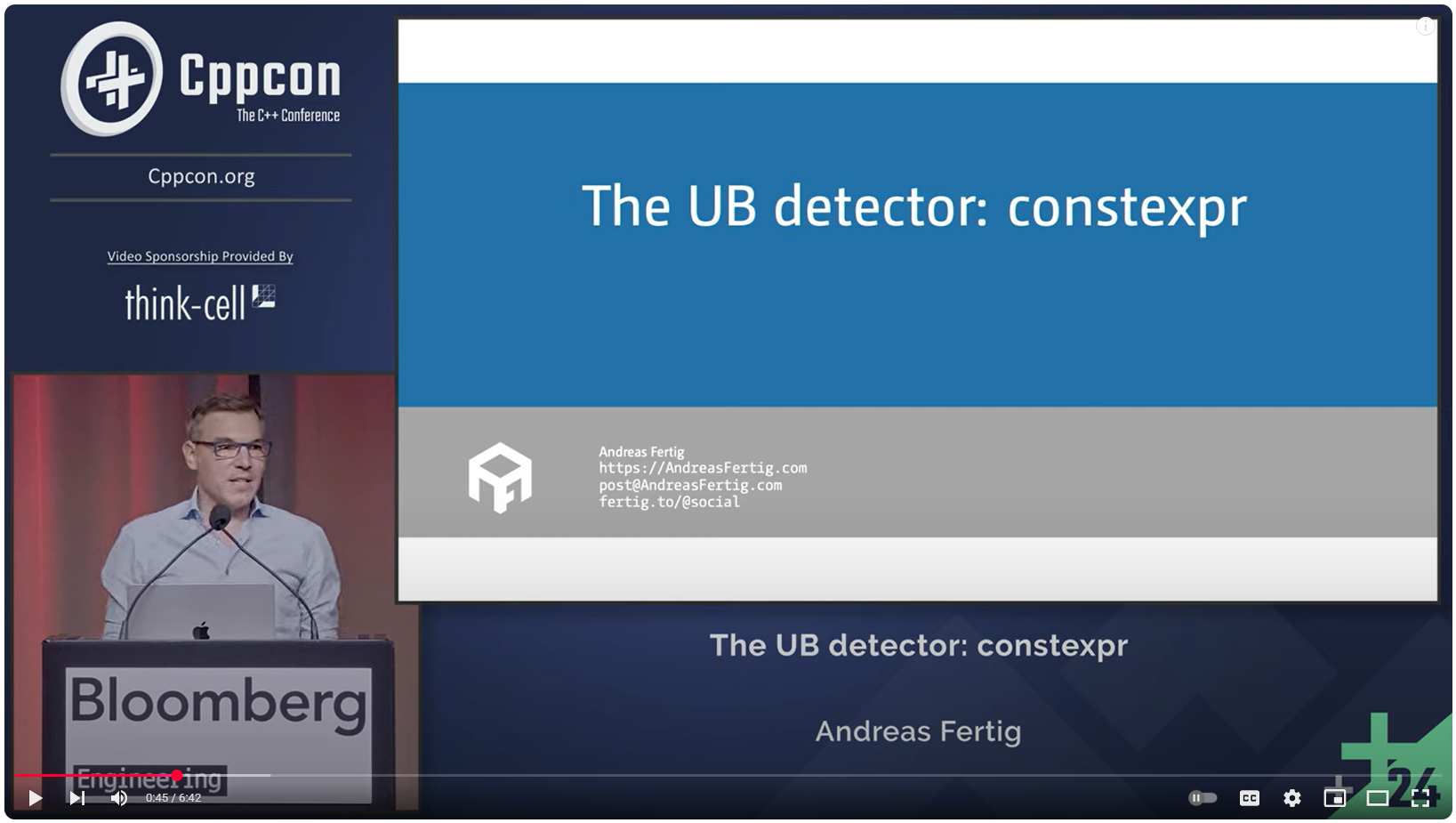Range adaptors – 5 years after C++20 -- Hannes Hauswedell
A look back on major design decisions in C++ Ranges and how they may be viewed today.
Range adaptors - 5 years after C++20
by Hannes Hauswedell
Watch now:
March 11-13, Online
March 16-18, Madrid, Spain
March 23-28, Croydon, London, UK
March 30, Kortrijk, Belgium
May 4-8, Aspen, CO, USA
May 4-8, Toronto, Canada
June 8 to 13, Brno, Czechia
June 17-20, Folkestone, UK
September 12-18, Aurora, CO, USA
November 6-8, Berlin, Germany
November 16-21, Búzios, Rio De Janeiro, Brazil
By Hannes Hauswedell | Feb 23, 2026 03:18 PM | Tags: None
A look back on major design decisions in C++ Ranges and how they may be viewed today.
Range adaptors - 5 years after C++20
by Hannes Hauswedell
Watch now:
<iframe allow="accelerometer; autoplay; clipboard-write; encrypted-media; gyroscope; picture-in-picture; web-share" allowfullscreen="" frameborder="0" height="315" referrerpolicy="strict-origin-when-cross-origin" src="https://www.youtube-nocookie.com/embed/nficAvk5RA4?si=w86EVk7oX89uVcPg" title="YouTube video player" width="560"></iframe>
By Blog Staff | Jan 15, 2026 11:14 AM | Tags: None

Templates and metaprogramming considered as the big bad wolf of C++, and it’s time to stop being scared of this wolf, as it’s one of the most powerful creatures of C++.
Talk: Who’s Afraid of the Big Bad Template
by Coral Kashri
From the description:
In this talk I’ve demonstrated the power of this incredible creature, while I hope that this talk would be an easy enterence to this concept (pan intended), and to help you developing the anticipation to walk into the cave of metaprogramming.
The talk was give on Core C++ 2025.
By Blog Staff | Jan 15, 2026 11:14 AM | Tags: None

Templates and metaprogramming considered as the big bad wolf of C++, and it’s time to stop being scared of this wolf, as it’s one of the most powerful creatures of C++.
Talk: Who’s Afraid of the Big Bad Template
by Coral Kashri
From the description:
In this talk I’ve demonstrated the power of this incredible creature, while I hope that this talk would be an easy enterence to this concept (pan intended), and to help you developing the anticipation to walk into the cave of metaprogramming.
The talk was give on Core C++ 2025.
By Meeting C++ | Dec 23, 2025 10:17 AM | Tags: security safety meetingcpp community basics advanced
Thanks to James McNellis to giving an introduction to this crutial technique for protecting C++ applications, which he has practical experience with.
A little Introduction to Control Flow Integrity - James McNellis - Keynote Meeting C++ 2025
by James McNellis
Watch the video:
By Meeting C++ | Dec 19, 2025 12:24 PM | Tags: security safety meetingcpp community c++20 c++17 basics
The Opening Keynote by Anthony Williams from Meeting C++ 2025 has been released.
Software and Safety - Anthony Williams - Keynote Meeting C++ 2025
by Anthony Williams
Watch now:
By Meeting C++ | Nov 23, 2025 09:18 AM | Tags: meetingcpp c++17 c++11 basics advanced
Patrice Roy gave a great talk online on C++ casts at Meetign C++ 2025
To lie, and hopefully - to lie usefully - Patrice Roy - Meeting C++ 2025
by Patrice Roy
By Meeting C++ | Nov 20, 2025 07:51 AM | Tags: meetingcpp community
The first video from Meeting C++ 2025. As every year the online track is released first.
The Code is Documentation Enough - Tina Ulbrich - Meeting C++ 2025
by Tina Ulbrich
Watch now:
By philsquared | Aug 8, 2025 01:18 AM | Tags: None
How do you quickly explore an unfamiliar C or C++ codebase? We'll use Doom as an example to demonstrate how to navigate an unfamiliar codebase.
Explore the Doom C Codebase in VS Code | Learn to Navigate Complex C and C++ Code on Linux
by Greg Law
From the description:
Using the classic Doom C program on Linux as our real-world example, we trace the exact moment a zombie is killed and backtrack through the codebase to understand how it happened [..] using Undo’s Time Travel Debugging technology.
By Meeting C++ | Jul 20, 2025 04:43 AM | Tags: meetingcpp intermediate embedded community c++23 c++20 c++17 basics
This weeks interview with Amar about his book on C++ on embedded systems:
C++ in Embedded Systems Interview with Author Amar Mahmutbegović
by Jens Weller
Watch the video
By Blog Staff | Jun 26, 2025 01:28 PM | Tags: None
 Registration is now open for CppCon 2025! The conference starts on September 15 and will be held in person in Aurora, CO. To whet your appetite for this year’s conference, we’re posting videos of some of the top-rated talks from last year's conference. Here’s another CppCon talk video we hope you will enjoy – and why not register today for CppCon 2025!
Registration is now open for CppCon 2025! The conference starts on September 15 and will be held in person in Aurora, CO. To whet your appetite for this year’s conference, we’re posting videos of some of the top-rated talks from last year's conference. Here’s another CppCon talk video we hope you will enjoy – and why not register today for CppCon 2025!
Lightning Talk: The UB Detector: constexpr
by Andreas Fertig
Summary of the talk:
A constexpr function evaluated at compile time is free of any undefined behaviour they say. Do you think that statement is true as well?